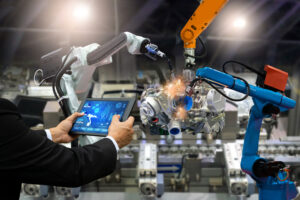
To keep your competitive edge, you have to continue to get smarter on the manufacturing floor. Smart Manufacturing, what does it all mean?
Also known as Industry 4.0 or industrial IoT, smart manufacturing enables manufactures to maximize the yield from existing production capabilities and develop the next generation of production capabilities necessary to compete in a digital economy.
What is Smart Manufacturing?
The term smart manufacturing arose in the mid-2000s, prompted by the arrival of new technologies such as 3D printing (additive manufacturing) and artificial intelligence. Other concepts like “digital manufacturing” and “cyber manufacturing” converge under the smart manufacturing label. At this time, global standards are still being developed to further define smart manufacturing approaches.
Smart manufacturing has been defined as the fully-integrated, collaborative manufacturing systems that respond in real-time to meet changing demands and conditions in the smart factory, the supply network, and customer needs.
Smart industry is a synonym for Industry 4.0 or industrial transformation in the fourth industrial revolution within which smart manufacturing de facto fits.
Characteristics of Smart Manufacturing
The processes integrated in Smart Manufacturing have real-time information, enhance control and base part of them on automation. Smart factories are based on 4 fundamental technological pillars:
- Connectivity, data and computational power. This includes IoT, Cloud Monitoring with MES or ERSP tools, and Blockchain.
- Analytics and intelligence. This feature encompasses fully evolved data analysis, thanks to Artificial Intelligence, Machine Learning and Deep Learning.
- Genuine human-machine interaction. Virtual reality, robotics and automation at the service of human needs.
- Advanced engineering. From the creation of Digital twins, to the meticulous work with nanoparticles.
On the other hand, to carry out Smart Manufacturing, it is necessary to cover the 4 main areas of Factory 4.0: materials, quality, maintenance and production. Bringing these four branches of industry closer to users, in an intelligent and systematised way, will considerably reduce costs and production times, opening up the possibility of designing strategies and outlining outstanding decisions for the future.
The Benefits of Digital Twins
Digital twin is another concept in the ecosystems of smart manufacturing. Digital twins are a powerful smart manufacturing tool that supports production.
A digital twin is the creation of an identical virtual product or system before a physical prototype is manufactured.
This virtual environment allows manufacturers to run simulations, iterations and testing on the design of a product to ensure viability before extensive production costs are incurred.It creates the virtual model of an asset, process, or system by using the data obtained from sensors in the systems or asset and algorithms for making reasonable projections about the process. Predictive maintenance is one of the important systems which will use digital twins.
The research published by Gartner put digital twins as part of the top 10 strategic trends from 2017 and estimated that by 2020 there would be billions of processes related to this technology. In addition, according to Markets and Markets, the market related to the generation of digital twins is estimated to grow to 35. 8 billion in 2025.
The benefits of digital twins include potential reduction in time and cost of product development and elimination of unplanned downtime. The rising adoption of IoT and cloud platforms, and 3D printing and 3D simulation software are boosting the adoption of digital twin.
Aerospace & defense, automotive & transportation, electronics & electrical/machine manufacturing, and energy & utility are the major adopter of digital twins. Once the concept of digital twins develops and matures, then we may see its increasing application in non-manufacturing sectors such as retail & the consumer goods market.
If you want to implement Smart Manufacturing technologies, reach out to us and our experts will advise you so that you can boost your company.
NC-Vision supports organizations with its revolutionary toolbox for production and traceability. Our NoCode approach lets you mix and match exactly the modules you need, from supporting your production line to warehouse management, quality or traceability – whatever you or your clients require.
You can configure and adapt all modules to your specific needs and processes, without a single line of code.













